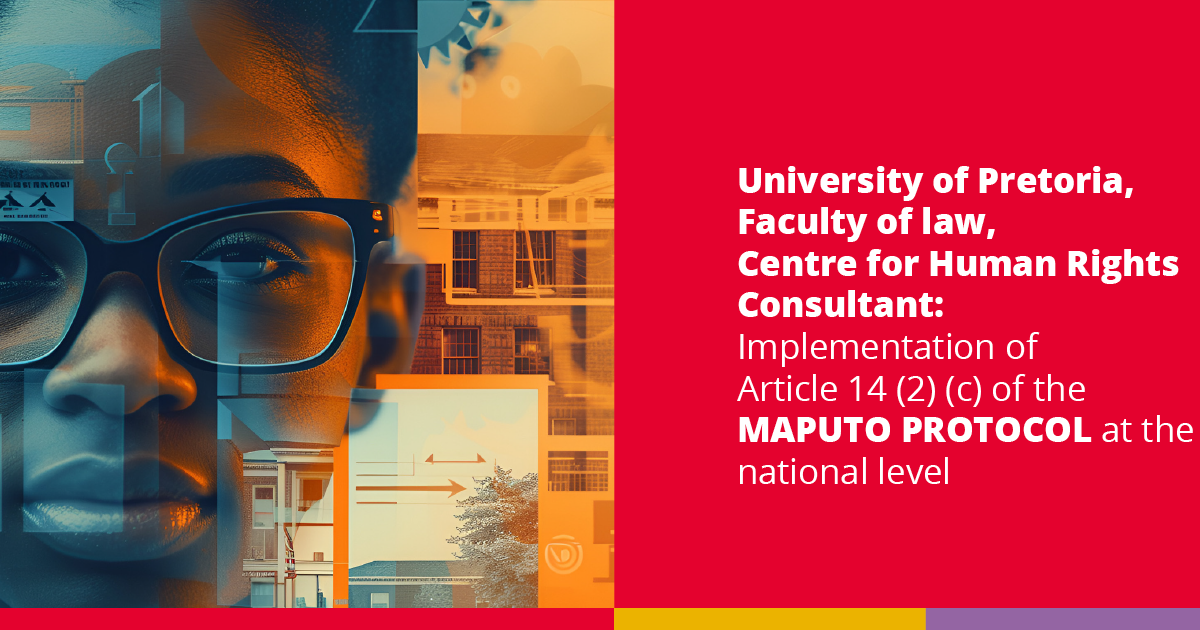In pursuit of the ideals of excellence, the University of Pretoria wishes to invite applications for the following vacancy. The University of Pretoria's commitment to quality makes us one of the top research Universities in the country and gives us a competitive advantage in international development.
The Centre for Human Rights, Faculty of Law, University of Pretoria seeks the consultancy services of two consultants to conduct a study to review and analyse the extent to which African governments have reformed laws and policies on abortion in line with the Maputo Protocol. The study seeks to review laws, policies and programmes as well as case law to ensure safe abortion services in the region, using two case studies.
Unsafe abortion remains a serious challenge in many Africa countries. This is due to the fact that the majority of African countries still retain very restrictive laws on abortion. The World Health Organisation (WHO) has estimated that abortion accounts for about 13% of all maternal mortality in the region. The African human rights system remains the most promising in terms of norms and standards to realise safe abortion services for women. Aside the important provisions of the African Charter on Human and Peoples’ Rights (ACHPR/ African Charter) and the African Charter on the Rights and Welfare of the Child (ACRWC), the African Union in 2003 adopted the Protocol to the African Charter on the Rights of Women (Maputo Protocol). The Maputo Protocol is often regarded as one of the most radical and progressive human rights instruments on women’s rights, especially sexual and reproductive health and rights (SRHR). Article 14 of the Maputo Protocol contains very detailed provisions in relation to the SRHR of women and girls. It contains a number of firsts- the first human instruments to recognise transmission of HIV as a human rights issue and right of women to seek abortion services on certain grounds.
Despite the progressive provisions of the Maputo Protocol regarding abortion, some countries have not actively implemented Article 14. This has been attributed to different reasons including logistical challenges to ensure the progressive realisation of SRHR, lack of political goodwill and the failure to prioritise SRHR. This has made the effective implementation of the article 14 (2) (c ) almost impossible. It is therefore imperative, to understand the nature of challenges militating against the implementation of article 14 at the national level.
Responsibilities:
The consultants will be responsible for conducting research for and preparing a report on the status of implementation of Article 14(2)(c) of the Maputo Protocol in two selected African countries. The research report will achieve the following:
- Analyse laws and policies on abortion services in two selected African countries.
- Discuss some of the barriers to safe abortion services in two selected African countries.
- Examine challenges to legal reform on abortion in the two selected African countries.
- Identify opportunities for reforms of abortion laws in the selected African countries.
The work is to be completed as per the following timeline:
| Activity | Deliverable | Timeline |
| Research Report Outline | Report Outline | 10 days |
| Draft Report | First Draft Report | 2 months |
| Final Report | Final Report | 1 month |
| Validation Workshop (2024 | Consultation | 10 days |
The position is home-based.
Minimum requirements:
- Postgraduate degree in law, development, gender or social sciences with about 6 years’ experience working in the field of women’s rights and SRHR.
- Ability to synthesize materials of diverse nature.
- Good knowledge of the African human rights system.
- Three years of professional experience with non-profit human rights focused organisations, research projects, advocacy campaigns or government offices.
- Experience with desktop and qualitative research.
Required competencies (skills, knowledge and behavioural attributes)
- Enthusiasm for women’s rights and SRHR advocacy.
- Skills required of consultants.
- Analytical skills.
- Excellent research and inter-personal skills.
- Highly motivated with ability to meet deadlines.
- Confidence and the ability to be proactive and work independently.
In applying for this post, please attach the following documents and send the email to / rutendo.chinomona@up.ac.za/bianca.knight@up.ac.za:
- A cover letter;
- A comprehensive CV;
- A writing sample of no more than 15 000 words; and
- Names, e-mail addresses and telephone details of three referees whom we have permission to contact.
Closing date: 30 June 2024 / ENQUIRIES: matilda.lasseko-phooko@up.ac.za and rutendo.chinomona@up.ac.za
No application will be considered after the closing date, or if it does not comply with at least the minimum requirements.
Only shortlisted candidates will be contacted.


